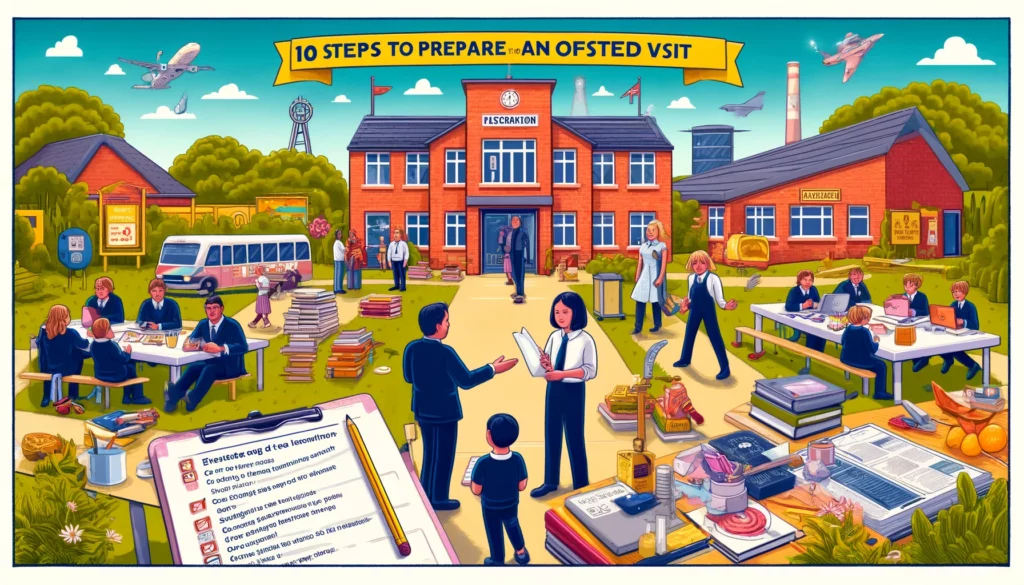Welcome to our blog post where we tell 10 crucial steps to prepare your school for an Ofsted Inspection.

1. Maintain Business as Usual
When that final call for Ofsted Inspection comes in, endure the urge to scramble and over-prepare. Draw attention to the importance of a normal day ensuring minimal disruption to your school’s routine. Trust in the systems and routines you have established.
Ofsted inspectors are people too, and they want to see how your school operates on a typical day. So stick to your strengths and avoid making last-minute changes as it may cause more confusion. Trust your timetable choices, faculty members training and best practices. This will eventually reflect positively on your institution and outcome.
2. Develop an Operational Plan
Appoint responsibilities just to make sure that the school continues to function smoothly during the inspection period. Thisalso includes having a designated operational headteacher to manage day-to-day tasks.
Make certain that all staff members are aware of their roles and responsibilities, encouraging a sense of preparedness and confidence. Prepare practical information such as maps, staff lists and even access to the school’s wifi for the inspectors. Make sure your safeguarding lead, key administrative staff and other crucial personnel are ready to provide necessary documents and information promptly.
3. Assess Previous Inspection Points
First of all you must understand how your school has progressed since the last inspection. Highlighting previous points of development can provide quite valuable insight into areas needing improvement and help prioritise future initiatives. Be proactive about areas that need improvement and demonstrate the steps taken to address these issues.
For example, if previous feedback highlighted space in certain places, then you better show how you have implemented targeted interventions. Moreover, Marina Gaze, a former Ofsted Deputy Director, advises that it is better to sort out known issues proactively instead of concealing them. In other words, addressing problems head-on is preferable to hiding them.
4. Prioritise Safeguarding
Ensure that your safeguarding procedures are robust and ingrained within the school culture. Inspectors will scrutinise not only the implementation of guidelines but also the overall attitude towards safeguarding. Make sure all staff are well-versed in safeguarding policies and know how to report concerns.
Review records and analysis of exclusions, bullying, and safeguarding incidents. Demonstrating a strong safeguarding culture, especially how you adapted these measures during the pandemic, will be critical. Ofsted will expect comprehensive safeguarding policies and evidence of their implementation.

5. Familiarise Yourself with the Inspection Handbook
Utilise the Ofsted inspection handbook as a valuable resource. Understand the evidence inspectors will seek and prepare to provide it, such as trends in attendance and behaviour data. Knowing the specific language and criteria Ofsted uses can help align your preparations.
For instance, the handbook outlines the importance of demonstrating the intent, implementation, and impact of your curriculum. Make sure your staff understand the relevant keywords and concepts that Ofsted inspectors will be using.
6. Evidence and Articulate Impact
First and foremost, demonstrate the effectiveness of interventions by showcasing tangible results. Moreover, articulate the impact of initiatives on student outcomes through data analysis and testimonials. Furthermore, clear and concise documentation of progress and impact is crucial. In addition, track learner success meticulously through ongoing surveys, one-to-ones, and intervention reports.
Consequently, this data should highlight the progress of every student, especially those with special educational needs and disabilities. Finally, use personalised learner journeys to showcase individual achievements.
7. Know your school inside out
School leaders should have a deep understanding of their institution’s strengths and weaknesses. To begin with, take control of the inspection process by suggesting areas for scrutiny that align with your school’s priorities. Furthermore, highlight successes and be prepared to discuss ongoing challenges and plans for improvement.
This entails being familiar with the four key Ofsted categories: quality of education, behaviour and attitudes, personal development, and leadership and management. Moreover, prepare detailed explanations and evidence for each area, showing a clear understanding and strategic planning.
8. Facilitate Honest Conversations
Foster transparent dialogue among staff members, ensuring discussions are evidence-based and improvement-focused. Engage in peer review to stress-test key areas of concern. Open communication channels can help in identifying and addressing potential issues before the inspection.
Encourage staff to discuss their areas of strength and areas needing improvement openly. Conduct mock inspections to simulate the actual inspection day, which can help staff feel more comfortable and prepared.
9. Summarise Key Data Points
Condense relevant data into easily digestible summaries for meetings with inspectors. Prepare to discuss high-level impact data and provide evidence to support your school’s performance. This includes maintaining detailed records of attendance, behaviour, and safeguarding incidents.
Provide inspectors with key documents such as the school timetable, current staff list, and the school improvement plan. Ensure that you have all necessary data ready, including records of exclusions, bullying incidents, and safeguarding referrals.
10. Be Honest and Forward-Thinking
Embrace honesty about your school’s current standing and articulate plans for improvement. Focus on inclusivity and proactive measures to ensure progress for all students. Demonstrating a commitment to continuous improvement and transparency can leave a positive impression on inspectors.
Show how you are addressing the challenges posed by the pandemic, particularly in areas such as curriculum adaptation, remote education, and safeguarding. Be prepared to discuss how you plan to close learning gaps and support students’ personal development.
Conclusion
By following these 10 essential steps, you can navigate an Ofsted visit with confidence and effectively demonstrate your school’s ongoing commitment to excellence in education. Firstly, preparation is key; however, authenticity and a forward-thinking mindset are equally important. Staying organised and maintaining clear communication channels will support your efforts. By combining thorough preparation with genuine engagement and a proactive approach, you will be well-equipped to impress during your Ofsted visit. Good luck!









